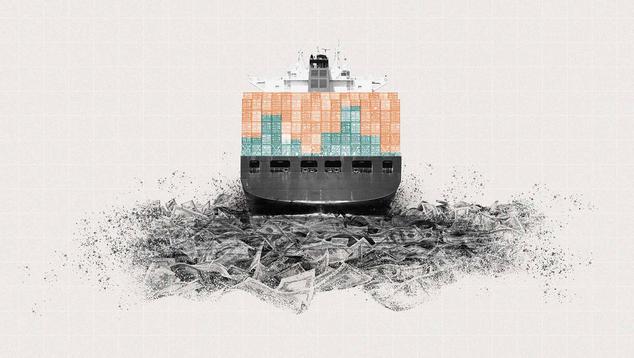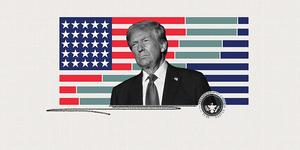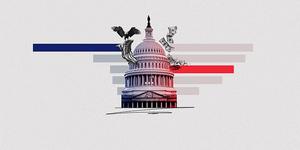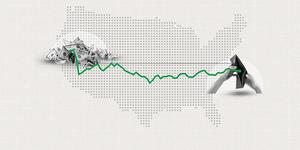Story Highlights
- Most say tariffs will cost more than they yield in the short and long term
- 89% expect higher U.S. prices; 49%, more U.S. manufacturing jobs
- Republicans view tariffs more positively than Democrats, independents
WASHINGTON, D.C. — Americans are widely skeptical about the benefits of the recent tariffs the Trump administration has imposed on the United States’ trading partners, with majorities believing they will ultimately cost the U.S. more money than they generate — in the short term (70%) as well as the long run (62%).
Most U.S. adults, 89%, think the tariffs are likely to result in higher prices on the products they buy, while the public is evenly divided over the likelihood that the tariffs will bring more manufacturing jobs to the U.S. Americans have little appetite for long-term disruption to the U.S. economy before they see any economic benefits from the higher tariffs.
Republicans are more likely than Democrats and independents to say the tariffs will bring in more money to the U.S. than they cost and will create more manufacturing jobs at home. While the large majority of Republicans agree with Democrats and independents that the tariffs will result in higher prices on the products they buy, Republicans are willing to tolerate economic disruption for longer.
These findings are from a Gallup web poll conducted April 2-15, as President Donald Trump initiated a major shift in U.S. trade policy through a series of tariff measures. These included a 10% blanket tariff on most imports and higher and targeted tariffs on countries that have significant trade surpluses with the U.S., notably China. The announcement of the tariffs triggered strong reactions from international trade partners and business leaders and sparked sharp declines in stock values and a selloff in U.S. government bond markets. Although some of the tariffs were later suspended, financial markets have continued to experience volatility.
Majorities Expect Tariffs Will Cost U.S. More Than They Bring In
One risk of the U.S. raising tariffs on its trading partners is that those countries could retaliate with higher tariffs on U.S. products — as China has already done. In addition to curbing consumer demand, this would hinder the budgetary goal of increasing federal revenue through tariffs.
Americans generally think the new tariffs will cost the U.S. more than they bring in from other countries in the short term, with 70% holding this view. That contrasts with 29% who believe the tariffs will be a net revenue gain for the U.S. The latter view is held by a majority of Republicans, 63%, compared with 25% of independents and 4% of Democrats.
The public is slightly more optimistic about the impact that tariffs will have in the long run, although more still say they will cost more (62%) than they benefit (36%) the U.S. financially. Again, Republicans are much more positive, with 77% foreseeing a net gain for the U.S., versus 31% of independents and 6% of Democrats.
Most in U.S. Expect Higher Prices; Public Divided on U.S. Job Creation
The large majority of Americans, 66%, believe higher tariffs are “very likely” to result in increased consumer prices, and another 23% say it is “somewhat likely.” This perception is even more pronounced among Democrats, 92% of whom think higher consumer prices are very likely, and 5% somewhat likely. In contrast, 36% of Republicans say higher prices are very likely, and 46% think they are somewhat likely to result. Still, vast majorities of both party groups expect the new tariffs to lead to higher prices.
The public is more divided on whether tariffs will lead to an increase in U.S. manufacturing jobs, with about half of U.S. adults overall saying this is likely (25% very and 24% somewhat), and the other half saying it is not too (32%) or not at all (18%) likely. However, partisans have sharply different perspectives on this question. Most Republicans believe tariffs are very (56%) or somewhat (29%) likely to boost manufacturing jobs. Democrats, on the other hand, are highly skeptical, with only 21% saying more jobs are very (3%) or somewhat likely (18%) to result, while 79% of Democrats doubt this outcome.
Independents align closely with the national averages on both measures.
Americans Unwilling to Endure Extended Economic Disruption
Trump has acknowledged that Americans might experience some economic discomfort because of his tariff policies but has asserted that the long-term benefits would justify the short-term challenges. The April poll suggests that Americans’ tolerance for discomfort comes down to how “short-term” is defined.
Overall, 31% of U.S. adults say they would not accept any economic disruption at all from tariffs, while 68% would put up with at least a few months. Those willing to tolerate some unease divide about evenly between accepting a few months (20%), up to a year (22%) or more than a year (26%) of economic pain.
Partisan differences are particularly stark, with Democrats far less inclined than Republicans to endure prolonged hardship of a year or longer. A slim majority of Democrats, 51%, are not willing to accept any disruption at all, along with 34% of independents and just 4% of Republicans. Another 33% of Democrats, 38% of independents and 60% of Republicans say they would tolerate up to one year. That leaves one-third of Republicans, 28% of independents and 15% of Democrats willing to endure a multiyear economic disruption to realize the possible benefits of tariffs.
In summary, although Republicans are far more willing to allow economic disruption to go on for more than a few months (69%, vs. 48% of independents and 29% of Democrats), there is little appetite even among Republicans for a multiyear disruption.
Bottom Line
Americans are broadly skeptical that Trump’s recent wave of tariffs will yield meaningful economic benefits, particularly in the short term. Most expect the tariffs to lead to higher consumer prices, and few believe they will bring in more revenue than they cost, while about half think they will result in increased U.S. manufacturing jobs. In addition to higher prices, the disruption could include supply chain problems, reduced U.S. exports, business slowdowns, job losses and an economic recession.
While Republicans express more optimism and a greater willingness to accept economic disruption, independents and Democrats are far less convinced — about both the potential upsides of the policy and the worthiness of enduring any economic pain to achieve them.
These findings suggest a challenging political environment for sustaining aggressive tariff policies, particularly as the public’s appetite for disruption is limited. Anything lasting more than a few months will severely test Americans’ patience, and anything beyond a year is even less likely to be tolerated.
To date, Trump has shown a willingness to make exceptions to the high tariffs he announced on April 2, amid pushback from other countries and key U.S. industries. As economic consequences continue to unfold, public opinion may prove to be another constraint on how far the U.S. can go in reshaping its trade relationships through tariffs.
To stay up to date with the latest Gallup News insights and updates, follow us on X @Gallup.
Learn more about how the Gallup Panel works.




